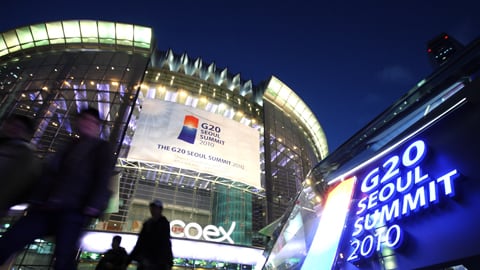The G-20 convenes in Seoul on Thursday. This is the fifth summit of the group and the one where the world was supposed to come together to rebalance the global economy. Instead, it increasingly looks like the meeting where international cooperation will fail.
Confused? So are the pundits. Just two weeks ago, the experts were saying the Seoul summit would be superfluous as there was nothing left to decide. “The accomplishments of Group of 20 finance ministers and central bankers after marathon meetings this weekend didn’t leave their bosses—the presidents and prime ministers of the world’s big economic powers—much to do when they meet for a summit in Seoul next month,” wrote The Wall Street Journal’s Evan Ramstad at the end of October.
Ramstad reported that the attendees of the G-20 finance ministers meeting in Gyeongju, South Korea looked like they had wrapped up just about everything. The post-meeting communiqué stated G-20 members would try to eliminate “excessive imbalances.” Countries would move toward “market determined exchange rate systems.” Nations with reserve currencies would guard against “disorderly movements in exchange rates.” The IMF would monitor progress.
Problem solved? Not quite. The agreement was rich in aspiration but lacking in specific targets or timetables. Treasury Secretary Timothy Geithner wanted the group to accept a general guideline of 4 percent of gross domestic product: current-account surpluses or deficits of greater than that amount would merit special scrutiny. Geithner, however, did not get his way.
His failure didn’t really matter because it didn’t take long for the watered-down deal to unravel. This month, the Federal Reserve unveiled its quantitative easing plan, nicknamed “ QE2.” By buying U.S. government debt, the Fed is pumping $600 billion of liquidity into the American economy as stimulus. More to the point, the maneuver is increasing the U.S. money supply by that amount.
And what is the effect of Ben Bernanke’s gusher? Just about everyone sees it this way: More dollars in circulation means continuing drops in the value of the currency. Countries hoarding greenbacks anticipate they will suffer enormous losses.
Like China for instance. One look at QE2 convinced Beijing that the Gyeongju deal, if it ever really existed, was off. “The artificial setting of a numerical target cannot but remind us of the days of a planned economy,” Vice Foreign Minister Cui Tiankai told The Wall Street Journal, commenting on Geithner’s plan, at the end of last week. “We believe a discussion about a current-account target misses the whole point. If you look at the global economy, there are many issues that merit more attention—for example, the question of quantitative easing.”

The Chinese are not only upset about the losses they will sustain on their $2.65 trillion of foreign exchange reserves, they’re also terrified that Gentle Ben will blow up their economy and send it spinning out of control. They know QE2 has the potential of creating a tidal wave of liquidity that will cross the Pacific and inundate China as investors take cheap money in the U.S. and invest it there. The result will be even bigger property and stock market bubbles as well as higher inflation.
Beijing also realizes it is losing clout in the American capital. It seems the more Chinese officials talk to Washington about their concerns, the less the Obama administration listens to them. For instance, Bernanke, despite their protests, went right ahead with QE2.
“There is now a zero-sum game between an angry China that insists on maintaining an unsustainable economic model and a floundering America, which needs to take steps to jumpstart its economy.”
We can’t fault the Chinese for being concerned—everything they worry about is real. So is America to blame for the coming breakdown in the global economy?
Not exactly. There would be no need for QE2—or for QE3, QE4, and all the other QEs to come—were it not for China’s predatory currency policies. First, those Chinese policies produced gargantuan trade surpluses, which resulted in larger foreign currency reserves. Beijing naturally recycled those reserves, so China contributed to the global flood of liquidity that created asset bubbles in the U.S. And we all know what those asset bubbles did to the global economy in 2008. Second, if the Chinese government did not rig the value of the renminbi at an artificially low level—the currency is perhaps 40 percent below its true value—U.S. manufacturers would be doing much better, making quantitative easing unnecessary.
And what about QE2 blowing up the Chinese economy? That’s Beijing’s fault. QE2 would not affect China if the Chinese did not maintain a system that requires them to buy dollars earned by their exporters. When Beijing pays for those dollars with renminbi, it inflates its own money supply. China, therefore, is at the mercy of the Federal Reserve, but only because it has trapped itself. Beijing could untrap itself by reforming its system, but it has decided not to do that.
There is now a zero-sum game between an angry China that insists on maintaining an unsustainable economic model and a floundering America, which needs to take steps to jumpstart its economy. Unfortunately, these two countries have little room to maneuver—their interests are diametrically opposed—and not much inclination to consider the interests of the other.
And what does this all mean? Short answer: The failure of the multilateral G-20 process. The presidents and prime ministers will issue another grand communiqué at the end of the Seoul summit, but we all know the truth. Unless there is a miracle in South Korea, the next stop is a global currency war.
Gordon G. Chang is a Forbes.com columnist and the author of The Coming Collapse of China.






